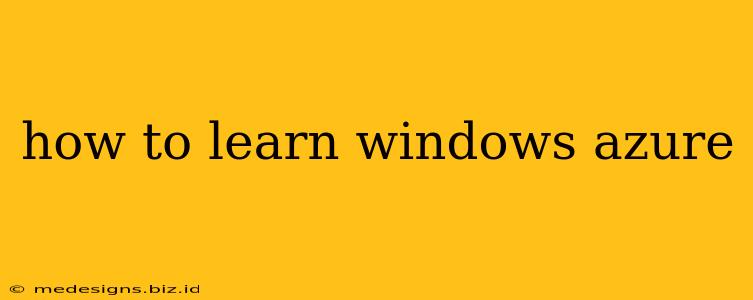Learning Microsoft Azure, formerly known as Windows Azure, can seem daunting, but with a structured approach and the right resources, you can become proficient in this powerful cloud platform. This guide provides a roadmap for your Azure learning journey, covering various learning paths tailored to different experience levels.
Understanding Microsoft Azure
Before diving into the specifics, it's crucial to understand what Azure is. It's a cloud computing platform providing a vast array of services, including compute, storage, networking, databases, analytics, AI, and IoT. These services are delivered on-demand, meaning you only pay for what you use. Understanding the core concepts of cloud computing—IaaS (Infrastructure as a Service), PaaS (Platform as a Service), and SaaS (Software as a Service)—is fundamental to grasping Azure's capabilities.
Learning Paths for Different Skill Levels
Beginners: Getting Started with Azure Fundamentals
If you're new to cloud computing, start with the basics. Focus on:
- Azure Fundamentals Learning Path: Microsoft offers a well-structured learning path specifically designed for beginners. This typically includes introductory videos, documentation, and hands-on labs to build a foundational understanding.
- Free Tier Services: Take advantage of Azure's free tier to experiment with various services without incurring costs. This allows you to get practical experience without financial risk.
- Azure Documentation: Microsoft's official Azure documentation is comprehensive and well-organized. It's an invaluable resource for learning about specific services and features.
- Online Courses: Platforms like Coursera, edX, and Udemy offer various Azure courses, many of which are beginner-friendly and provide structured learning experiences.
Intermediate: Mastering Specific Azure Services
Once you've grasped the fundamentals, focus on specific Azure services that align with your interests or career goals. Consider specializing in areas like:
- Compute: Learn about Virtual Machines (VMs), App Services, and Azure Kubernetes Service (AKS).
- Storage: Understand Blob storage, Queue storage, and Table storage.
- Databases: Explore Azure SQL Database, Cosmos DB, and other database options.
- Networking: Learn about Virtual Networks, Load Balancers, and Virtual Private Networks (VPNs).
Advanced: Architecting and Implementing Complex Solutions
For advanced learners, the focus shifts to designing and implementing complex cloud solutions. This involves:
- Azure Architect Certification: Obtaining an Azure Architect certification demonstrates advanced knowledge and skills. Preparing for this certification will solidify your understanding of complex Azure architectures.
- Real-world Projects: The best way to learn advanced concepts is by building real-world projects. This could involve designing and implementing a complete cloud application or migrating existing on-premises applications to Azure.
- Community Engagement: Engaging with the Azure community through forums, meetups, and online communities helps you learn from experienced professionals and share your knowledge.
Key Skills to Develop
Regardless of your experience level, developing these skills is essential for success with Azure:
- Cloud Concepts: Understanding IaaS, PaaS, and SaaS is fundamental.
- Azure Portal Navigation: Familiarity with the Azure portal, the primary interface for managing Azure resources, is crucial.
- Azure CLI or PowerShell: Mastering the command-line interface for Azure provides efficient management capabilities.
- Networking Fundamentals: A solid understanding of networking concepts is essential for designing and implementing secure and scalable Azure solutions.
- Security Best Practices: Learn how to secure your Azure resources and protect sensitive data.
Resources to Help You Learn
- Microsoft Learn: Microsoft's official learning platform offers numerous free courses and learning paths.
- Microsoft Azure Documentation: The official documentation is comprehensive and a valuable resource.
- Azure Blogs and Communities: Stay updated on the latest Azure news and best practices by following Azure blogs and engaging in online communities.
Learning Microsoft Azure is a continuous process. By following a structured approach, utilizing available resources, and focusing on key skills, you can build a strong foundation and advance your expertise in this powerful cloud platform. Remember to start small, focus on practical application, and consistently build upon your knowledge. Good luck on your Azure learning journey!
